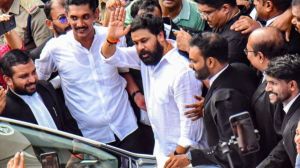Maratha quota case: 50% limit is ‘Lakshman Rekha’ for reservation, petitioners in SC
They argued that such a move will go against the equality principle enshrined in the Constitution and that the 50 per cent limit is the “Lakshman Rekha” that has to be followed by every State in granting reservation in jobs and education.
 A protest in Mumbai last October demanding speedy implementation of the Maratha quota. (Express photo by Prashant Nadkar/File)
A protest in Mumbai last October demanding speedy implementation of the Maratha quota. (Express photo by Prashant Nadkar/File)A week after a five-judge Constitution bench of the Supreme Court said it will consider whether the 1992 verdict in the Indira Sawhney case (popularly known as Mandal Commission case) — capping reservation at 50 per cent — by a nine-judge bench needs to be sent to a larger bench for a relook, petitioners against the Maratha reservation law on Monday opposed any reconsideration of the ceiling. They argued that such a move will go against the equality principle enshrined in the Constitution and that the 50 per cent limit is the “Lakshman Rekha” that has to be followed by every State in granting reservation in jobs and education.
Appearing for the petitioners, Senior Advocate Arvind Datar on Monday told the bench that the right to equality is a meta right, a right above all rights. Articles 15, 16 of the Constitution, which enable the state to make provision for reservation, he said, are intended to promote equality. “To change the 50 per cent limit is to have a society not founded on equality, but based on caste,” he said.
The bench, headed by Justice Ashok Bhushan, and comprising Justices L Nageswara Rao, S Abdul Nazeer, Hemant Gupta, and S Ravindra Bhat, is hearing arguments on the constitutional validity of the Maharashtra State Reservation for Socially and Educationally Backward Classes (SEBC) Act, which the petitioners argue has taken the total reservation beyond the 50 per cent limit.
On Monday, Datar recalled how several states made provisions for quota shortly before the Model Code of Conduct kicked in, and said the 1992 verdict should not be revisited in the backdrop of “political considerations”. He referred to the 10.5 per cent reservation for Vanniya Kula Kshatriyar in Tamil Nadu this year, the inclusion of Nadar Christians in OBC category in Kerala in 2014, and Madhya Pradesh extending the OBC quota from 14 to 27 per cent ahead of the 2019 Lok Sabha polls.
Datar said the 1992 verdict made a very limited exception to the general rule of the 50 per cent limit, allowing relaxations in “extraordinary situations” and involving “far-flung areas”, adding that “extreme caution has to be exercised” even in such cases. He said the exception could not have been for states like Maharashtra, Tamil Nadu or Karnataka, which are “relatively prosperous”, but far-flung remote areas which require special treatment.
The Mandal Commission had in 1980 declared the Maratha community to be forward and in 2000, the National Commission for Backward Classes rejected a request for inclusion of the community in backward classes, saying that they were “socially advanced and prestigious”, he said.
“What is the extraordinary situation in the case of Maharashtra,” Datar asked, and said that the state government’s stand that “Marathas are backward and that they form 30 per cent of the population is the extraordinary situation” is not correct. “The 50 per cent limit is the Lakshman Rekha that has to be followed by every State legislature in making reservations to public posts and education,” he said.
Senior Advocate Shayam Divan, also appearing for the petitioners, pointed to the Justice M G Gaikwad Commission’s report which formed the basis for Maharashtra to enact the 2018 law, and claimed it was flawed as it failed to consider that the community is politically organised and politically dominant. Such a community cannot be backward, he argued.
On the report attributing farmer suicides to the backwardness of the Maratha community, he said the deaths were due to a general agrarian crisis and not due to backwardness.
The arguments remained inconclusive and will resume Tuesday.







